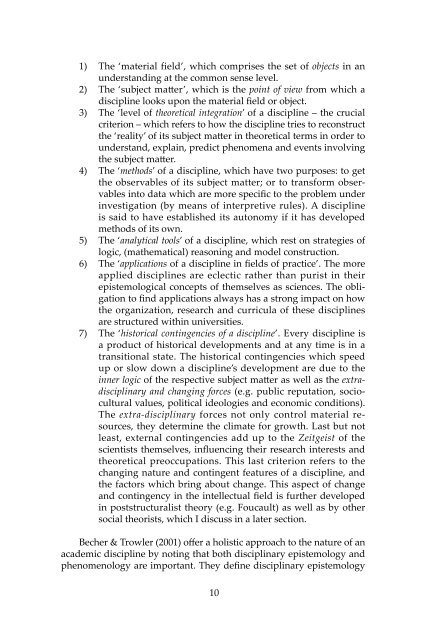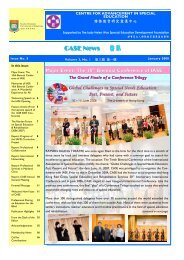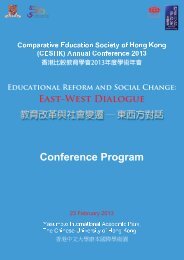Comparative Education Bulletin - Faculty of Education - The ...
Comparative Education Bulletin - Faculty of Education - The ...
Comparative Education Bulletin - Faculty of Education - The ...
You also want an ePaper? Increase the reach of your titles
YUMPU automatically turns print PDFs into web optimized ePapers that Google loves.
1)<br />
2)<br />
3)<br />
4)<br />
5)<br />
6)<br />
7)<br />
<strong>The</strong> ‘material field’, which comprises the set <strong>of</strong> objects in an<br />
understanding at the common sense level.<br />
<strong>The</strong> ‘subject matter’, which is the point <strong>of</strong> view from which a<br />
discipline looks upon the material field or object.<br />
<strong>The</strong> ‘level <strong>of</strong> theoretical integration’ <strong>of</strong> a discipline – the crucial<br />
criterion – which refers to how the discipline tries to reconstruct<br />
the ‘reality’ <strong>of</strong> its subject matter in theoretical terms in order to<br />
understand, explain, predict phenomena and events involving<br />
the subject matter.<br />
<strong>The</strong> ‘methods’ <strong>of</strong> a discipline, which have two purposes: to get<br />
the observables <strong>of</strong> its subject matter; or to transform observables<br />
into data which are more specific to the problem under<br />
investigation (by means <strong>of</strong> interpretive rules). A discipline<br />
is said to have established its autonomy if it has developed<br />
methods <strong>of</strong> its own.<br />
<strong>The</strong> ‘analytical tools’ <strong>of</strong> a discipline, which rest on strategies <strong>of</strong><br />
logic, (mathematical) reasoning and model construction.<br />
<strong>The</strong> ‘applications <strong>of</strong> a discipline in fields <strong>of</strong> practice’. <strong>The</strong> more<br />
applied disciplines are eclectic rather than purist in their<br />
epistemological concepts <strong>of</strong> themselves as sciences. <strong>The</strong> obligation<br />
to find applications always has a strong impact on how<br />
the organization, research and curricula <strong>of</strong> these disciplines<br />
are structured within universities.<br />
<strong>The</strong> ‘historical contingencies <strong>of</strong> a discipline’. Every discipline is<br />
a product <strong>of</strong> historical developments and at any time is in a<br />
transitional state. <strong>The</strong> historical contingencies which speed<br />
up or slow down a discipline’s development are due to the<br />
inner logic <strong>of</strong> the respective subject matter as well as the extradisciplinary<br />
and changing forces (e.g. public reputation, sociocultural<br />
values, political ideologies and economic conditions).<br />
<strong>The</strong> extra-disciplinary forces not only control material resources,<br />
they determine the climate for growth. Last but not<br />
least, external contingencies add up to the Zeitgeist <strong>of</strong> the<br />
scientists themselves, influencing their research interests and<br />
theoretical preoccupations. This last criterion refers to the<br />
changing nature and contingent features <strong>of</strong> a discipline, and<br />
the factors which bring about change. This aspect <strong>of</strong> change<br />
and contingency in the intellectual field is further developed<br />
in poststructuralist theory (e.g. Foucault) as well as by other<br />
social theorists, which I discuss in a later section.<br />
Becher & Trowler (2001) <strong>of</strong>fer a holistic approach to the nature <strong>of</strong> an<br />
academic discipline by noting that both disciplinary epistemology and<br />
phenomenology are important. <strong>The</strong>y define disciplinary epistemology<br />
10
















